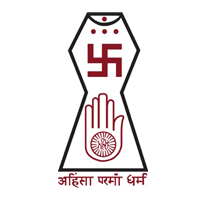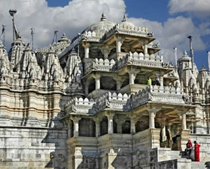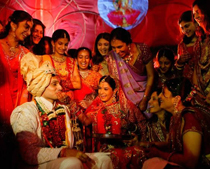
Jainism is a religion of purely human origin. It is preached by those who have attained perfect knowledge and self-control by their own personal efforts and have been liberated from the cycle of births and deaths.
Jain Philosophy
Jains do not believe in God as a Creator, a Destroyer or a Savior. Instead, they worship the 24 Tirthankars or Jinas. Jina literally means “Conqueror” and refers to one who has conquered the worldly passions like desire, hatred, anger, greed and pride by one’s own personal efforts and has thereby freed ‘his’ soul from the karmas obscuring knowledge, perception, truth and ability. Tirthankars show the path of purification (liberation) to their followers. Jains believe that every living being has the potential to become a Tirthankar. The ultimate goal of Jains is to rid the soul of all bad karmas and attain liberation
.
The main principles of Jainism are Ahimsa (non-violence), Anekantvad (multiplicity of views) and Aparigraha (non-possessiveness). The Jain code of conduct is made up of five vows – Ahimsa (non-violence), Satya (truthfulness), Aseteya (non-stealing), Aparigraha (non-possessiveness) and Brahmacharya (chastity).
Non-violence (Ahimsa) is upheld as the supreme religion and is practiced in all forms; mental (maan), verbal (vachaan), and physical (kaya), both knowingly and unknowingly. Jains have a deep compassion for all forms of life. They believe in equality of souls, ranging from human beings to animals and even microscopic living organisms. Jains are vegetarians and abstain from the use of animal products and strongly support the protection of the environment.
Worship
Jainism is a way of life with an ultimate objective to attain liberation. Souls are under the influence of its karmas (actions), both past and present. By observing certain rules and methods mentioned in the Agams (holy books), bad karmas can be extinguished. The Agam Sutras reflect Lord Mahavir’s (24th Tirthankar) preaching that were orally compiled by his immediate disciples.
Most Jains perform fasts, recite scriptures, and sing holy songs. Even silent prayers are considered a part of worship. Ceremonies, rituals and festivals are part of Jain tradition.
Decorum at Place of Worship
To worship God. one must be pure (Shudh). We have to have a bath and wear clean clothes before entering the temples. Footwear, food and drinks are not allowed in the prayer halls. Smoking, alcohol, non-vegetarian food including root vegetables is forbidden in the premises.
Greetings
The usual greeting is ‘Jai Jinendra’ meaning Honor to the Supreme Jina. ‘Michhami Dukkadam’ is a request for forgiveness, usually said after performing the annual forgiveness and repentance (Samavantsari pratikraman) ritual.
Jainism in Singapore
The Singapore Jain Religious Society was registered as a religious society and charitable trust in 1972, and has its premises at 18 Jalan Yasin. Regular prayer meetings, discourses, religious classes and celebration of Jain religious festivals are held.
Fight with yourself why fight with external foes?
He, who conquers himself through himself
will obtain happiness.
(Bhagwan Mahavir)
Singapore Jain Religious Society
www.sjrs.org.sg









